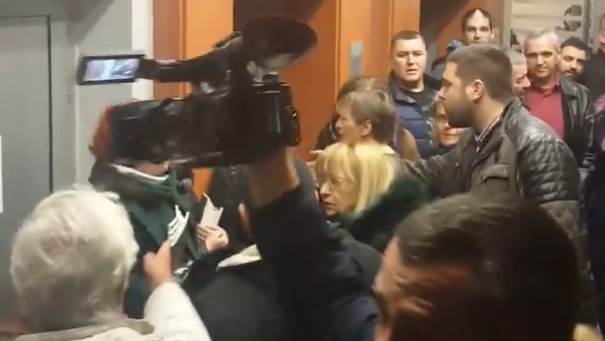
The members and supporters of the ultra-nationalist Serbian Radical Party (SRS) attacked Wednesday a group of NGO activists ahead of SRS leader and convicted war criminal Vojislav Seselj's book promotion, the Beta news agency reported.
The incident took place in the lobby of Belgrade's Stari Grad Municipality, the only one run by the opposition in the capital.
The activists of Humanitarian Law Centre (FHP), ZDF Forum and the Youth Initiative for Human Rights came to the event to take part in it and distribute FHP Dossier Crimes Against Croats in (Serbia's northern province) Vojvodina.
Four women and two men attacked them, pushed them hard, threw them on the floor and kicked them out, swearing at them.
"We entered the hall, and they started throwing us around, pushing us, swearing… They knocked down Natasa Kandic (of the FHP) and myself, kicked us out. We haven't seen any security, any police. At one point Seselj came and told them to kick us out," Natasa Govedarica, the director of the ZDF Forum Belgrade Office, said.
Kandic said that it was earlier possible to follow debates organised by (Bosnian Serb wartime commander on trial for war crimes) Ratko Mladic's supporters and different extremist organisations.
"We were not allowed then either, but without violence."
Govedarica added that "tonight's promotion of Seselj's book is the denial of genocide in a pseudoscientific form, signed by the convicted war criminal in the centre of Belgrade, in the premises financed by Serbia's citizens."
"That is the confirmation of the nationalistic politics Serbia led in the (the 1990s) wars and after them," she said.
Seselj was sentenced to ten years in jail by the Hague Tribunal for instigating the crimes against Croats and other non-Serbs in Vojvodina in the 1990s, among additional charges.
In the meantime, the leader of the banned neo-Nazi National Order Goran Davidovic, aka Führer, came back to Serbia after years of hiding and announced a comeback to politics. Some similarly oriented rights organisations said would join Führer.
The movements advocating xenophobia and ultra-nationalism mushroomed across Serbia, with experts warning that the extremist messages became a regular thing in the society
Kakvo je tvoje mišljenje o ovome?
Učestvuj u diskusiji ili pročitaj komentare





 Srbija
Srbija
 Hrvatska
Hrvatska
 Slovenija
Slovenija







